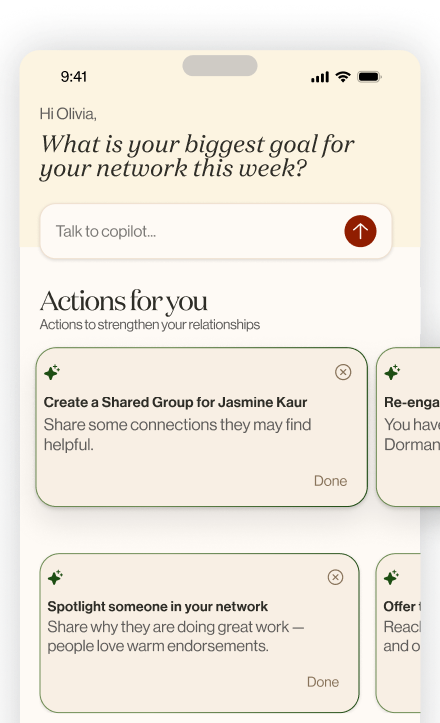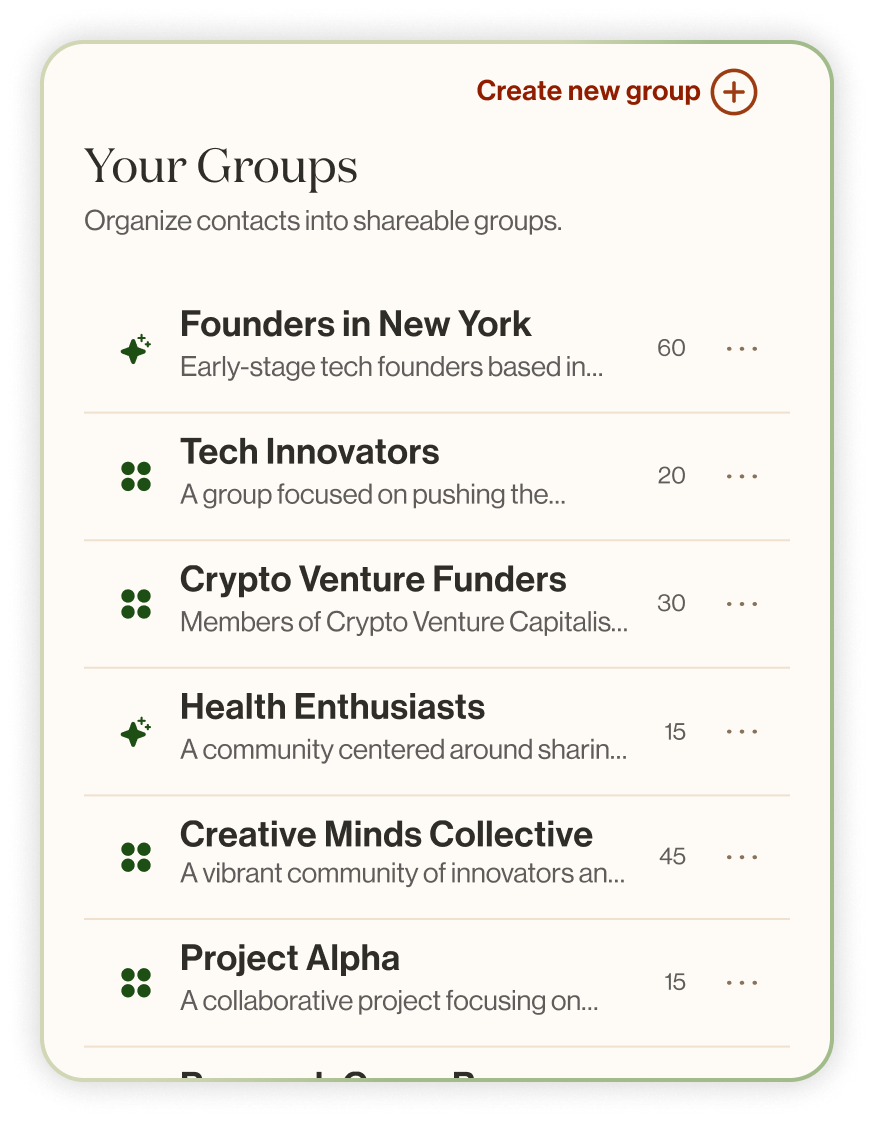Can AI Help To Restore The Art Of Networking?
Chief alum Caroline Dell's new startup Goodword is launching with $4 million in funding led by Human Ventures to find out.

The Upshot
Goodword CEO Caroline Dell can trace much of her founder journey to one fateful coffee.
In 2018, a local New York-based investor, Cat Middleton, sent Dell a cold email offering to meet. She said yes, and the chat led her to meet one of the co-founders of Chief. Dell would join as employee five, helping the network for women executives on its journey to 20,000 members, a $1 billion-plus valuation and then through a pandemic-induced pivot.
It delivered again last year, when Middleton introduced Dell to her Goodword cofounder, Chris Fischer. “It was a pivotal connection that really changed the trajectory of my career,” Dell says.
Now, Dell and Fischer are building a startup to facilitate more momentous meetings like the one behind their own partnership. Goodword’s app, which launches today, organizes a busy professional’s network to filter up interesting matches, potential introductions and action items that could potentially help either party.
“We’re solving a major need for people who have tons of connections, but have difficulty cultivating those relationships and keeping them warm,” Dell says.
Adds Fischer, Goodword’s chief product and technology officer: “You need some type of focus applied to the people you already know.”
How Goodword plans to do that is a mix of AI tools and community-building that results in an experience that’s part relationship manager, part professional network, and part career coach.
Users connect their knowledge graph to Goodword – contacts, calendar, and other post interactions – for its software to organize. That combined graph can then be searched and sorted much more easily across shared interests or other generated tags, with Goodword also recommending actions such as check-ins or introductions.
The idea is to support and cultivate more ‘super connectors’ like Middleton and Dell herself, without creating a transactions-fueled dystopia where we’re all spamming each other each day.
Goodword is launching today for ‘Founding Connector’ members in a few major hubs at first (New York, San Francisco, Los Angeles, Chicago), opening up gradually to its waitlist, which it says numbers in the thousands.
After a two-week trial, Goodword costs $199.99 for an annual membership, which the startup says will help it remain ad-free and sustainable (and hopefully expense-able).
A Brooklyn-based team of five, Goodword is also revealing that it raised $4 million in seed funding led by Human Ventures, with January Ventures, Ulu Ventures, Graham & Walker, Bain Future Back Ventures, Vitalize and personal investors including Chief’s cofounders participating. (While not an explicit goal, about 80% of Goodword’s cap table are women, Dell notes.)
Goodword’s launch – and its raise – may not compete for scale and resources with some of the buzzy pureplay AI startups we’ve covered in Upstarts. But it’s notable as the latest, and perhaps most promising, AI-enabled ‘prosumer’ startup to take a crack at Dunbar’s number, the theory that we can only maintain about 150 connections at a time.
Dell’s own VC friends warned her that “CRMs are a tar pit,” and a number of startups have looked to build personal relationship managers like a much lighter-weight Salesforce, only to pivot deeper into business use cases like sales and recruiting, or out of the market.
But as Fischer puts it: “Timing is everything.” Goodword’s duo don’t just have founder market fit in the credentials they bring to this attempt; they’re taking an approach of blending AI with a human touch that, if it works, will be useful for members and their networks, too.
AI is the technical unlock. But relationships are still something to cultivate, not bio-engineer. “We want to keep the human at the center,” Dell says.
How Goodword hopes to pull off that balance – and what it means for other startups – below.
Presented by Structify.
Your revenue team has 10 tools and 75 dashboards. None of them answer today’s question.
Structify’s AI agents connect directly to your revenue stack — from HubSpot, Salesforce, and Snowflake to CSVs and that random PDF your AE just slacked you.
Ask: “Show me a monthly overview of accounts that haven’t logged in since signing up”
Get the answer — instantly.
Sign up for free today — with $20 in free credits + access to a growing library of plug/play RevOps templates.
Spreading the good word
As Chief came out of the other side of the pandemic lockdown and Dell decided it was time to build her own company, she felt unfinished business.
Chief had taught her that a network became more powerful as it grew, but more unwieldy, too – inexorably turning into something more like LinkedIn over time.
She briefly considered launching a startup in women’s health, but the problem itched at her. “It was a space I couldn’t walk away from,” she says. “It felt like an unsolved problem.”
Raising a small amount from friends and family, she started tinkering and looking for a cofounder. Then she met Fischer, who was also “cofounder dating” after stints in technical leadership roles at a number of startups, including Aaptiv in fitness and Reonomy in real estate.
He’d also spent enough time in tech to lose track of more peers than most ever meet. Fischer jokes that when it came time for Goodword to raise funding, he was rueful about not keeping in better touch with another former boss, Shutterstock founder Jon Oringer.
“I only know a few billionaires,” Fischer jokes. “So I should’ve checked on Jon more often, like, ‘What’s going on?’”
Dell and Fischer agreed on a vision that would be much less transactional than that, instead helping to reconnect acquaintances around shared interests like cycling (a highly competitive duathlon contestant, Fischer spent a career break before Goodword biking across the U.S.).
A personal history checking in on Dell and a prototype was enough for Heather Hartnett at Human Ventures to invest early this year.
The firm’s name was a good sign of common ground. But Human Ventures was also trying to figure out its own shortcuts for dealing with fragmented connections, such as tracking when they last met with someone in person, instead of via email or text. Goodword’s approach of using natural language and “natural human behavior” resonated.
“People don’t always put a lot of measurement, or even understanding, or vocabulary, around the networks that actually make everything move,” Hartnett says. “Business is really done amongst people, not companies.”
That insight is core to Goodword’s UX so far – optimized for creating value on a weekly basis, not rewarding constant scrolling or gamified behavior, says Dell. Goodword’s AI copilot asks for a weekly goal or priority that it can orient its suggestions around; the app will also make several proactive recommendations for activities like introductions to make.
Users can also drop in notes about people they’ve met to provide context for the future, or to help Goodword tag them for future relevance.
“What’s crazy that we’ve learned from researching and talking with customers is that whatever you would typically write down about somebody to remember them, is almost the opposite of what makes you actually remember them,” Fischer says.
By that reckoning, Upstarts goes into Fischer’s Goodword notes as embodied by editor Alex in a blue denim jacket.
‘Fun and surprising’
There’s a cliche that VCs tend to invest in services that personally benefit them, and in this case, Goodword hits the mark.
It resonates at Upstarts, too, where we grapple on a daily basis with having accepted too many LinkedIn requests in a dubious push for “distribution”, and routinely go into scramble drills seeking expertise on a topic, like last week’s on AI code editor Cursor, where recent contact and responsiveness are powerful pulls.
Today, the ideal Goodword customer has a similar band of experience as a VC partner or a seasoned startup reporter. The average waitlist member has 4,500 LinkedIn followers; the most-followed boasts 800,000.
One early test user is Katie Dunn, a real estate and finance veteran who was an early Chief member. More recently, as she’s angel invested and worked with startups, Dunn’s connections have exploded, and she says that she was struggling to keep up.
“I need to be able to say: ‘Who is the person I met at that event last week? I know I took a note about them being a good marketing contact,’” explains Dunn.
An early test user, Dunn has proven enthusiastic enough to put together a syndicate for herself and others to personally invest in Goodword. “It’s weird how it knows a good person to reach out to in the moment, I don’t even know how,” she says. “It’s been surprising and fun to see.”
Goodword’s founders say it works well ‘single player’ for someone to enjoy without the rest of their network joining right away, but a big question will be what game those users want to play.
Some Goodword members might hope to connect other tools, like email automation flows, or otherwise maximize productivity gains in a way that could devolve Goodword into the kind of transactional feedback loop that it’s looking to solve against.
Keep things too hands-off, and it could become a ‘nice to have’ app without immediate value-add, eventually falling back into the land of lost apps in the back of phones.
It’s very early to call a winner. But any startup that can help to teach what can feel like a dying art today – graceful networking – benefits the ecosystem by trying.
“I’m hoping that through tools like this, people understand some of the more intangible EQ that goes into building relationships,” Hartnett says. “How are you thinking about building your network in a way that’s giving to the collective pot, not just taking from it?”






These are my favorite kind of startup stories! When superpowers collide to create a better way of doing these. We love a NY based AI biz too, go Goodword 👏
Congrats to Goodword on the launch!